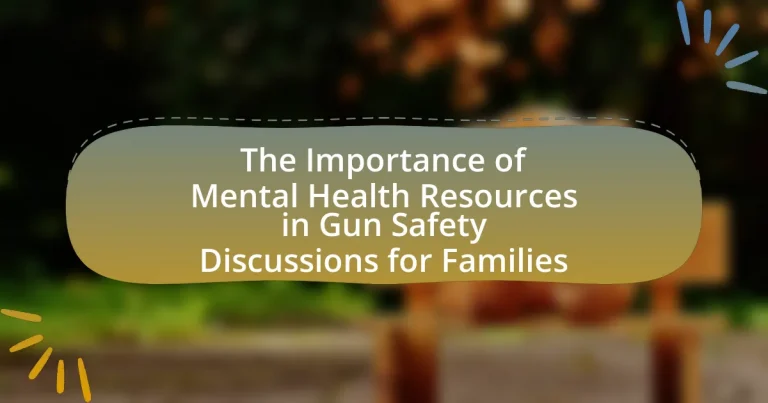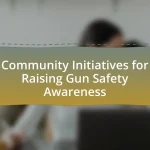The article emphasizes the critical role of mental health resources in discussions about gun safety for families. It outlines how addressing mental health issues can mitigate risks associated with firearm ownership, particularly in preventing gun-related incidents such as suicides and accidents. The content highlights the importance of integrating mental health support into gun safety conversations, identifies available resources for families, and discusses the challenges and stigma that may hinder these discussions. By prioritizing mental health, families can create safer environments and enhance overall well-being, ultimately contributing to community safety.
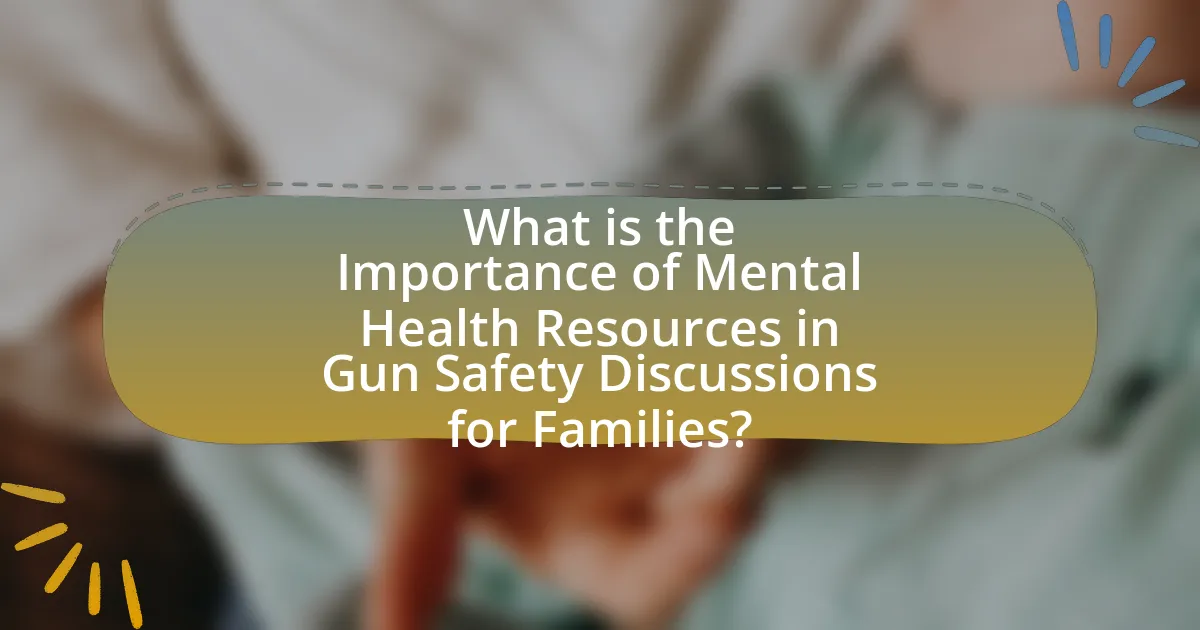
What is the Importance of Mental Health Resources in Gun Safety Discussions for Families?
Mental health resources are crucial in gun safety discussions for families because they help identify and address underlying psychological issues that may contribute to unsafe behaviors around firearms. Access to mental health support can lead to improved emotional well-being, reducing the risk of crises that could result in gun violence or accidents. For instance, studies indicate that individuals with untreated mental health conditions are more likely to engage in risky behaviors, including improper firearm storage or use. By integrating mental health resources into gun safety conversations, families can foster a safer environment, ensuring that both mental health and firearm safety are prioritized.
Why are mental health resources crucial in the context of gun safety?
Mental health resources are crucial in the context of gun safety because they help identify and address mental health issues that can lead to violent behavior. Studies indicate that individuals with untreated mental health conditions are at a higher risk of engaging in self-harm or harming others, particularly in situations involving firearms. For instance, the National Violent Death Reporting System shows that nearly 50% of gun-related deaths are suicides, often linked to mental health struggles. By providing access to mental health resources, families can better manage these risks, fostering safer environments and reducing the likelihood of gun-related tragedies.
How do mental health issues relate to gun safety concerns in families?
Mental health issues significantly increase gun safety concerns in families, as individuals with mental health disorders may be at a higher risk for impulsive behavior, including self-harm or harm to others. Research indicates that approximately 90% of individuals who die by suicide have a mental health condition, highlighting the critical need for safe storage practices for firearms in homes where mental health issues are present. Furthermore, studies show that access to firearms increases the risk of suicide and unintentional shootings, particularly among those experiencing mental health crises. Therefore, addressing mental health resources is essential in discussions about gun safety to mitigate these risks effectively.
What role do mental health resources play in preventing gun-related incidents?
Mental health resources play a crucial role in preventing gun-related incidents by addressing underlying psychological issues that may lead to violence. Access to mental health services can help individuals manage conditions such as depression, anxiety, and trauma, which are often linked to violent behavior. For instance, studies indicate that individuals with untreated mental health disorders are more likely to engage in violent acts, including gun violence. By providing early intervention and support, mental health resources can reduce the risk of individuals reaching a crisis point where they may resort to using firearms. Furthermore, community-based mental health programs have been shown to decrease rates of violence in populations at risk, highlighting the effectiveness of these resources in promoting safety and well-being.
How can families benefit from integrating mental health resources into gun safety discussions?
Families can benefit from integrating mental health resources into gun safety discussions by fostering a comprehensive understanding of the emotional and psychological factors that influence safe gun ownership and usage. This integration helps families recognize warning signs of mental health issues that could lead to unsafe behaviors around firearms, thereby promoting proactive measures such as seeking professional help or implementing safety protocols. Research indicates that mental health conditions, such as depression and anxiety, can increase the risk of firearm-related incidents, highlighting the importance of addressing these issues in safety conversations. By incorporating mental health resources, families can create a supportive environment that prioritizes both emotional well-being and responsible gun ownership, ultimately reducing the risk of tragic outcomes.
What specific mental health resources are available for families?
Families can access various mental health resources, including counseling services, support groups, educational programs, and crisis hotlines. Counseling services, such as those provided by licensed therapists or psychologists, offer personalized support for family members dealing with mental health issues. Support groups, often facilitated by organizations like the National Alliance on Mental Illness (NAMI), provide a community for families to share experiences and coping strategies. Educational programs, such as those offered by Mental Health America, equip families with knowledge about mental health conditions and effective communication strategies. Crisis hotlines, like the National Suicide Prevention Lifeline, offer immediate assistance and guidance for families in distress. These resources are essential for promoting mental well-being and fostering safe environments, particularly in discussions surrounding gun safety.
How can families access these mental health resources effectively?
Families can access mental health resources effectively by utilizing community services, online platforms, and educational programs. Community services often include local mental health clinics, support groups, and hotlines that provide immediate assistance and guidance. Online platforms, such as teletherapy services and mental health apps, offer convenient access to licensed professionals and self-help resources. Educational programs, often provided by schools or community organizations, can inform families about available resources and how to navigate them. According to the National Alliance on Mental Illness, approximately 1 in 5 adults experience mental illness, highlighting the importance of accessible resources for families seeking support.
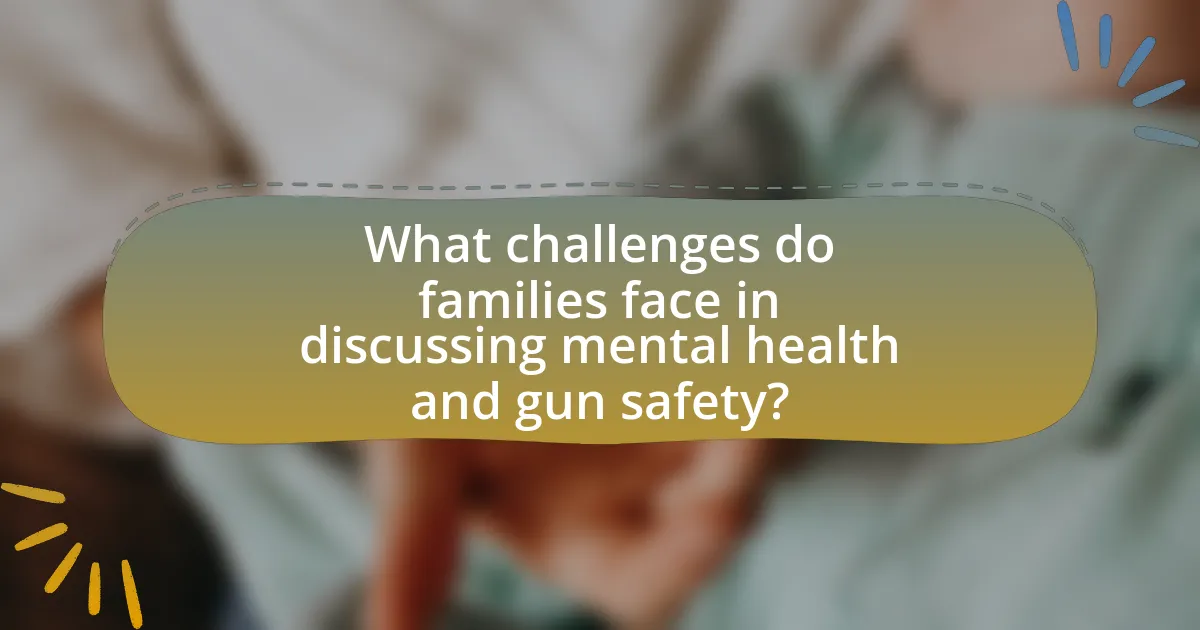
What challenges do families face in discussing mental health and gun safety?
Families face significant challenges in discussing mental health and gun safety due to stigma, lack of knowledge, and emotional discomfort. Stigma surrounding mental health can prevent open conversations, as individuals may fear judgment or misunderstanding from family members. Additionally, many families lack adequate knowledge about mental health issues and their connection to gun safety, which can lead to misinformation and ineffective discussions. Emotional discomfort arises from the sensitive nature of both topics, making it difficult for families to engage in productive dialogue. These challenges are compounded by the societal tendency to avoid discussing mental health, which can hinder proactive measures in ensuring safety.
Why is there stigma surrounding mental health discussions in relation to gun safety?
Stigma surrounding mental health discussions in relation to gun safety arises from societal misconceptions that equate mental illness with violence. This belief is perpetuated by media portrayals and a lack of understanding about mental health conditions, which often leads to fear and discrimination against individuals with mental health issues. Research indicates that only a small percentage of violent acts are committed by individuals with mental illness, yet the association persists, creating barriers to open dialogue about mental health in the context of gun safety. This stigma can prevent families from seeking necessary mental health resources, ultimately hindering effective discussions about gun safety and the well-being of individuals at risk.
How can families overcome the stigma associated with mental health?
Families can overcome the stigma associated with mental health by fostering open communication and education about mental health issues. By discussing mental health openly, families can create an environment where individuals feel safe to express their feelings and seek help. Research indicates that education reduces stigma; for instance, a study published in the journal “Psychological Medicine” found that increased knowledge about mental health leads to more positive attitudes towards individuals with mental health conditions. Additionally, families can engage in community support groups, which provide shared experiences and reduce feelings of isolation, further combating stigma.
What misconceptions exist about mental health and gun ownership?
Misconceptions about mental health and gun ownership include the belief that individuals with mental health issues are inherently violent and more likely to commit gun-related crimes. This stereotype is misleading, as studies indicate that only a small percentage of violent acts are committed by individuals with mental health disorders. For instance, research published in the American Journal of Public Health found that people with mental illness are more likely to be victims of violence rather than perpetrators. Additionally, another misconception is that mental health screenings can effectively predict future violent behavior, which is not supported by evidence; mental health conditions are complex and cannot be solely linked to violent tendencies.
What barriers prevent families from utilizing mental health resources for gun safety?
Barriers preventing families from utilizing mental health resources for gun safety include stigma, lack of awareness, and accessibility issues. Stigma surrounding mental health often leads families to avoid seeking help due to fear of judgment or discrimination. A study by the National Alliance on Mental Illness found that 64% of individuals with mental health issues reported feeling stigmatized, which can deter families from addressing mental health concerns related to gun safety. Additionally, many families may lack awareness of available mental health resources, as a survey by the American Psychological Association indicated that only 40% of respondents knew where to find mental health services. Accessibility issues, such as financial constraints and limited availability of services in rural areas, further complicate the situation, with the Substance Abuse and Mental Health Services Administration reporting that 60% of counties in the U.S. lack adequate mental health care providers.
How can families identify and address these barriers?
Families can identify and address barriers to mental health resources in gun safety discussions by actively engaging in open communication and seeking professional guidance. Open dialogue allows families to recognize misconceptions or stigma surrounding mental health, which can hinder access to necessary resources. Additionally, families can consult mental health professionals or community organizations that specialize in gun safety and mental health, providing them with tailored strategies to overcome these barriers. Research indicates that families who participate in structured discussions about mental health and gun safety are more likely to utilize available resources effectively, thereby enhancing their overall safety and well-being.
What community support systems can assist families in this regard?
Community support systems that can assist families in mental health resources related to gun safety discussions include local mental health organizations, community centers, and educational programs. These systems provide access to counseling services, workshops, and support groups that focus on mental health awareness and gun safety education. For instance, organizations like the National Alliance on Mental Illness (NAMI) offer resources and training for families to understand mental health issues and their implications for gun safety. Additionally, community centers often host events that promote safe gun storage practices and mental health resources, fostering a supportive environment for families to engage in these critical discussions.
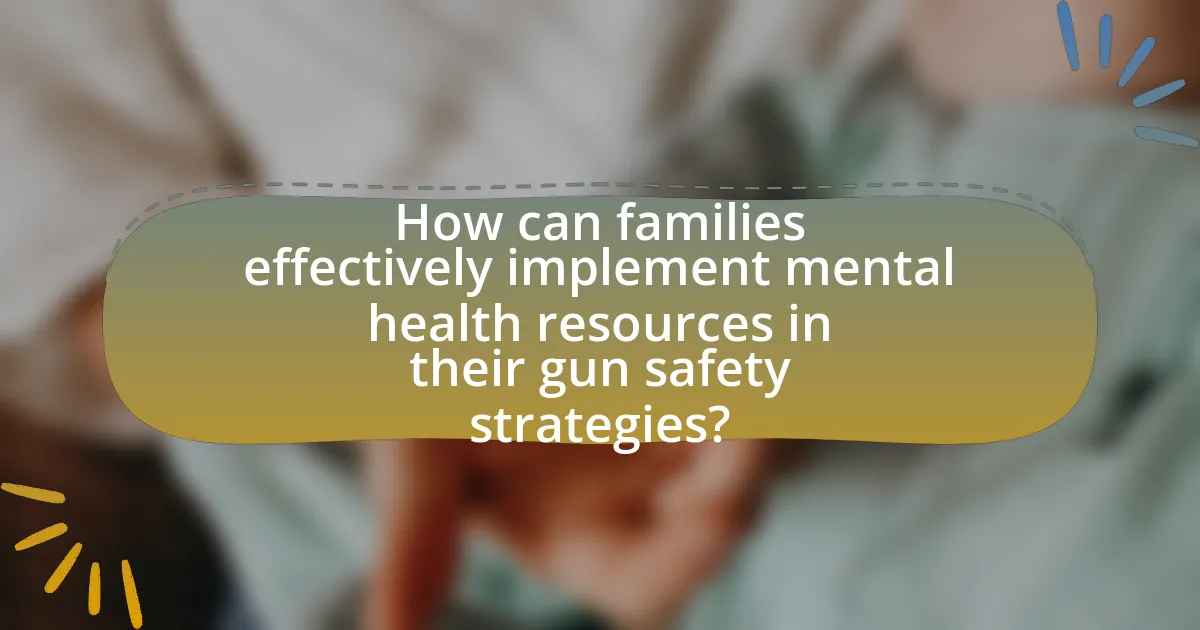
How can families effectively implement mental health resources in their gun safety strategies?
Families can effectively implement mental health resources in their gun safety strategies by integrating mental health education and support into their discussions about firearm storage and access. This approach ensures that family members understand the importance of mental well-being in relation to gun safety, particularly in preventing crises that could lead to unsafe situations. Research indicates that mental health issues are a significant risk factor in gun-related incidents; for example, the American Psychological Association highlights that individuals with untreated mental health conditions are at a higher risk for self-harm and impulsive behavior involving firearms. By providing access to mental health resources, such as counseling services and educational programs, families can foster an environment where mental health is prioritized alongside safe gun practices, ultimately reducing the risk of firearm-related tragedies.
What best practices should families follow when discussing mental health and gun safety?
Families should prioritize open communication and education when discussing mental health and gun safety. Engaging in honest conversations about mental health can help identify potential risks and promote understanding. Research indicates that 90% of gun deaths in the U.S. are suicides, highlighting the critical need for mental health awareness in gun safety discussions. Families should also establish clear rules regarding gun storage, ensuring firearms are stored securely and separately from ammunition. Additionally, utilizing mental health resources, such as counseling or support groups, can provide families with tools to address underlying issues effectively. By fostering a supportive environment and being proactive about mental health, families can significantly enhance gun safety.
How can families create a safe environment for these discussions?
Families can create a safe environment for discussions about mental health and gun safety by establishing open communication, setting ground rules for respectful dialogue, and ensuring a non-judgmental atmosphere. Open communication encourages family members to express their thoughts and feelings without fear of backlash, which is essential for discussing sensitive topics like mental health and gun safety. Setting ground rules, such as listening without interrupting and validating each other’s feelings, fosters respect and understanding. A non-judgmental atmosphere allows individuals to share their concerns and experiences freely, which is crucial for addressing the complexities of mental health in relation to gun safety. Research indicates that families who engage in open discussions about mental health are better equipped to handle crises and reduce stigma, ultimately promoting a safer environment for all members.
What tools and resources can facilitate these conversations?
Mental health resources that can facilitate conversations about gun safety for families include educational programs, counseling services, and community workshops. Educational programs, such as those offered by the National Alliance on Mental Illness (NAMI), provide families with information on mental health issues and their relation to gun safety. Counseling services, like those from the American Psychological Association, offer professional support for families to discuss sensitive topics. Community workshops, often organized by local health departments or non-profits, create safe spaces for families to engage in dialogue about mental health and gun safety, fostering understanding and proactive measures. These resources are essential in bridging the gap between mental health awareness and responsible gun ownership.
What are the long-term benefits of prioritizing mental health in gun safety discussions?
Prioritizing mental health in gun safety discussions leads to reduced gun violence and improved community safety. By addressing mental health, stakeholders can identify and support individuals at risk of harming themselves or others, thereby preventing potential tragedies. Research indicates that mental health interventions can decrease the likelihood of violent behavior; for instance, a study published in the American Journal of Public Health found that mental health treatment significantly lowers the risk of future violence among individuals with mental health disorders. Additionally, fostering open conversations about mental health can reduce stigma, encouraging more individuals to seek help, which ultimately contributes to safer environments for families and communities.
How does prioritizing mental health contribute to overall family well-being?
Prioritizing mental health significantly enhances overall family well-being by fostering healthier communication and emotional resilience among family members. When families actively support mental health, they create an environment where individuals feel safe to express their feelings, leading to reduced stress and conflict. Research indicates that families who engage in mental health practices experience improved relationships and better coping strategies during crises, which is particularly relevant in discussions surrounding gun safety. For instance, a study published in the Journal of Family Psychology found that families who prioritize mental health resources report higher levels of satisfaction and lower instances of familial discord. This evidence underscores the critical role that mental health plays in nurturing a supportive family dynamic.
What impact does this have on community safety and awareness?
The availability of mental health resources significantly enhances community safety and awareness by addressing underlying psychological issues that may contribute to gun violence. Research indicates that communities with accessible mental health services experience lower rates of gun-related incidents, as these resources help individuals manage crises and reduce the risk of violent behavior. For instance, a study published in the American Journal of Public Health found that states with comprehensive mental health programs reported a 20% decrease in firearm homicides. This correlation underscores the importance of integrating mental health discussions into gun safety conversations, ultimately fostering a safer community environment.
What practical steps can families take to enhance their discussions on mental health and gun safety?
Families can enhance their discussions on mental health and gun safety by establishing open communication channels and creating a safe environment for dialogue. Regularly scheduling family meetings focused on these topics encourages participation and reduces stigma. Utilizing educational resources, such as workshops or literature on mental health and gun safety, provides families with factual information to guide discussions. Engaging in role-playing scenarios can help family members practice how to address sensitive issues effectively. Research indicates that families who communicate openly about mental health are better equipped to handle crises, as seen in studies showing that proactive discussions can lead to improved mental health outcomes and safer environments.
